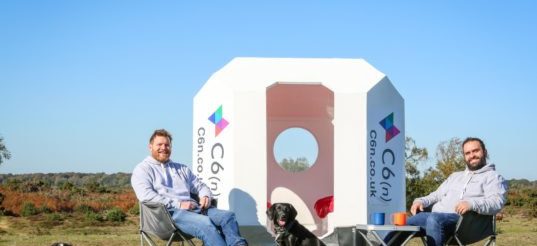Housing made of recycled plastic offers alternative to festival waste | Inhabitat – Green Design, Innovation, Architecture, Green Building

Outdoor festivals and events have been popular across the world since the days of Roman gladiators and for good reason. They are a great way to enjoy music, art and other entertainment while being surrounded by nature. Unfortunately, festivals are also associated with a lot of waste. One company, Above All C6(n), is leading efforts to find a solution for the temporary tent accommodations that often get left behind at these events. With the knowledge that thousands of tents get tossed after major festivals, the company created the Pod(o), a reusable sleeping pod made from recycled, single-use plastic rather than virgin materials.
Charlie Hall, founder and managing director of Above All C6(n), said, “People were really interested in the technology behind it as well as the design, but what makes it especially appealing is the fact that it, like all our building components, provides a use for single-use plastic, which is a truly global problem.”
In addition to repurposing plastic originally headed to the landfill, Above All designed the Pod(o) to be multi-purpose and durable. The modular design makes the pods adaptable for a variety of uses. They are stackable, can be linked together and can even connect to solar power, a water supply and a bio toilet.
For portability, the pods can be taken apart, transported and set up in another location by just a few people. The goal is for the Pod(o) to be used again and again for years as a replacement for single-use tents at many events.
Currently, the design of the Pod(o) accommodates two people, but the company is working to scale the design for larger options. Based out of Christchurch, Dorset, U.K., Above All has also designed other modular and portable structures intended for community use. The company focus is aimed at fixing problems within the construction and housing markets, such as waste during and after construction, longevity of products and shortage of availability.
Beginning with the initial idea of sturdy and reusable festival lodging, it didn’t take long for the company to envision other uses for the pods. Now, it plans to promote them as a solution for all types of temporary housing needs: people in between accommodations, those affected by natural disaster, military persons or firefighters stationed remotely, workers designated to a construction site, people at sporting tournaments and workers and visitors to other pop-up events.
“We aim to create a local sustainable legacy,” Bex Ricketts, the business development manager of Above All, told Inhabitat. “Collect locally, employ locally, make locally, re-use locally and benefit local charities. Sustainable as engineered for zero-waste, 100 percent reusable and lasts indefinitely. Creating a legacy is most important, as something that has been created to last for generations has to be useful and designed to be future proof.”
